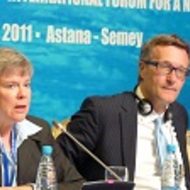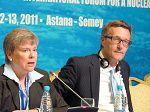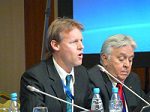International Forum For A Nuclear Weapons-Free WorldOctober 12-13, 2011 On October 12-13, the Government of Kazakhstan convened the “International Forum for a Nuclear Weapons-Free World” which hosted 400 scientists, experts politicians and representatives from different countries, and the heads and representatives of international organizations including the United Nations (UN), the International Atomic Energy Agency (IAEA), the Organization for Security and Cooperation in Europe (OSCE), the Shanghai Cooperation Organization (SCO), the Collective Security Treaty Organization (CSTO), the Eurasian Economic Community (EurAsEC), the Conference on Interaction and Confidence Building Measures in Asia (CICA), United Nations Educational, Sceintific and Cultural Organization (UNESCO), and the Comprehensive Test-Ban Treaty Organization (CTBTO). The Global Security Institute was represented by Jonathan Granoff (GSI President) and Alyn Ware (Global Coordinator of Parliamentarians for Nuclear Non-proliferation and Disarmament). The Forum issued a declaration calling for a world without nuclear weapons (in Russian) urging all nations to “pursue further practical steps and effective measure toward the total elimination of nuclear weapons.” Via video message, Secretary-General Ban Ki-moon told participants, “We all know the terrible danger of nuclear weapons. And we also know that the way to get rid of the threat is to get rid of the weapons. Progress depends on global cooperation. That is why this meeting and your continued engagement is critical.” Kazakhstan President Nulsultan Nazarbayev told participants, “a nuclear weapons-free world is not a utopia. It is a reality that already exists in a large part of the world. Zones free of nuclear weapons exist in Central and South America, Australia and Oceania, Africa, Southeast and Central Asia – it is nearly half of the world. Today, we need an effective mechanism of international legal guarantees from all nuclear states for the members of these zones.”
The conference reiterates a long disarmament history for Kazakhstan. Yukiya Amano, General Director of the IAEA, highlighted Kazakhstan’s complete dismantling of the world’s fourth largest nuclear arsenal and importance in establishing a Nuclear Weapons-Free Zone for central Asia. Kazakhstan is also the likely host of an IAEA International nuclear fuel bank aimed at centralizing enrichment programs. Emphasizing a strong relationship with the US government on issues of nuclear security, the US delegation was lead by the Deputy Secretary of Energy Dan Poneman, and included Assistant Secretary of State for the Bureau of Arms Control, Verification and Compliance Rose Gottemoeller, Assistant Secretary of Defense for Nuclear, Chemical, and Biological Defense Programs Andrew Weber and Laura S. Holgate, Senior Director of WMD Terrorism and Threat Reduction on the National Security Council. Delivering a message from President Obama, Poneman applauded Kazakhstan’s leadership in nuclear security. Poneman also remarked that “the choice faced by Kazakhstan 20 years ago – either to cling to its inherited nuclear stockpile of more than 1,400 nuclear warheads, or to embrace a future as a leader of a world free of nuclear weapons – has had a dramatic impact on the global community and nuclear security efforts worldwide.”
Global Security Institute President Jonathan Granoff addressed the Forum outlining “three paths before us: One is ad hoc incremental steps with numerous preconditions before actually commencing the real work of negotiating disarmament. Two is beginning the creation of a comprehensive framework that incorporates both incremental steps, but insures the clarity of purpose of disarmament, thus forming a basis to critique diversions from the disarmament process and a context to integrate many programs and approaches. Third is a fast-track toward a convention with prompt commencement of preparatory work, leading to negotiations as early as possible. I think the latter two are much preferred and the ad hoc incremental approach is proving to be too slow.”
The conference, which marked the 20th anniversary of the closing of the Semipalatinsk nuclear test site, also urged all nations to ratify the Comprehensive Test-Ban Treaty. Tibor Toth of the CTBTO told participants to “Close the door once and for all on nuclear testing.” Similarly, US Assistant Secretary, Bureau of Arms Control, Verification and Compliance Rose Gottemoeller announced increased efforts by the US to ratify the Comprehensive Nuclear Test Ban Treaty and achieve its full entry-into-force: “Together we can engage audiences at the government and non-governmental level – we can reach mothers, fathers, students, retirees, government workers, factory workers and farmers. Since explosive nuclear testing affects us all, the goal should be to have people talking about the CTBT in their legislatures and around their kitchen tables. Leading by example, Kazakhstan and the United States can build the momentum needed to bring the CTBT into force” The message to ban nuclear testing echoed at the second day of the Forum when participants were hosted at the National Nuclear Center in Kurchatov and the actual nuclear testing sight of Semipalatinsk. Although a symbolic visit, Jonathan Granoff remarked about the powerful experience, “It was a reminder that nuclear weapons can create hell on earth.”
Alyn Ware and Jonathan Granoff also held separate meetings with leading parliamentarians including the Speaker of Parliament Ural Muhamejanov, Chair of the Foreign Affairs Committee Amzebek Zholshibekov and legislators from the regions affected by nuclear testing. All of the parliamentarians they met, and a number of others, joined Parliamentarians for Nuclear Non-proliferation and Disarmament (PNND) as a result of the meetings. Speaking at the PNND Assembly in Bern the following week, Kazakhstan Secretary of State Kanat Saudabayev followed up by inviting PNND to hold a parliamentary assembly in Kazakhstan in 2012 with a key focus to build parliamentary support and action for the CTBT and to achieve a nuclear-weapons-free world.
The Forum’s closing ceremony was held in the city of Semey’s Colonel Island to commemorate the twentieth anniversary of closing of the nuclear test site. More than 20,000 people gathered near the “Stronger than Death” monument, dedicated to the victims of nuclear testing. The event also included the opening of a new monument symbolizing the transition from tragedy to peace and creation.
Links:»International Forum for a Nuclear Weapons-Free World Final Declaration »Conference program with full statements from: »Full statement: Global Security Institute President, Jonathan Granoff |
||||||||||||||||||||









